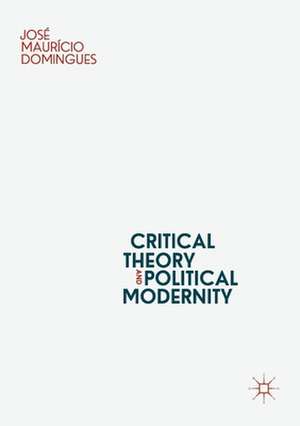Critical Theory and Political Modernity
Autor José Maurício Dominguesen Limba Engleză Paperback – 29 feb 2020
| Toate formatele și edițiile | Preț | Express |
|---|---|---|
| Paperback (1) | 269.99 lei 6-8 săpt. | |
| Springer International Publishing – 29 feb 2020 | 269.99 lei 6-8 săpt. | |
| Hardback (1) | 589.33 lei 6-8 săpt. | |
| Springer International Publishing – 5 feb 2019 | 589.33 lei 6-8 săpt. |
Preț: 269.99 lei
Nou
Puncte Express: 405
Preț estimativ în valută:
51.66€ • 55.25$ • 43.08£
51.66€ • 55.25$ • 43.08£
Carte tipărită la comandă
Livrare economică 17 aprilie-01 mai
Preluare comenzi: 021 569.72.76
Specificații
ISBN-13: 9783030439231
ISBN-10: 3030439232
Pagini: 323
Ilustrații: XX, 323 p. 3 illus.
Dimensiuni: 148 x 210 mm
Greutate: 0.42 kg
Ediția:1st ed. 2019
Editura: Springer International Publishing
Colecția Palgrave Macmillan
Locul publicării:Cham, Switzerland
ISBN-10: 3030439232
Pagini: 323
Ilustrații: XX, 323 p. 3 illus.
Dimensiuni: 148 x 210 mm
Greutate: 0.42 kg
Ediția:1st ed. 2019
Editura: Springer International Publishing
Colecția Palgrave Macmillan
Locul publicării:Cham, Switzerland
Cuprins
Introduction.- Part I.- Chapter 1: The Dual Individual and Its Rights.- Chapter 2: The State as Abstraction.- Chapter 3: From Abstract to Concrete.- Part II.- Chapter 4: The Political System.- Chapter 5: State Power, Autonomy, and Developmental Trends.- Chapter 6: The Developmental Dynamics of Citizenship and Autonomy.- Chapter 7: Global Ramifications: Sovereignty and Autonomy.- Part III.- Chapter 8: Regimes. - Chapter 9: Radical Democracy.
Notă biografică
José Maurício Domingues is Professor of Sociology in the Institute of Social and Political Studies at Rio de Janiero State University, Brazil. He is the recipient of the Anneliese Maier Research Award from the Alexander von Humboldt Foundation, Germany, for 2018-2023 and is the author of, among other texts, Emancipation and History: The Return of Social Theory (2018), Global Modernity, Development, and Contemporary Civilization: Towards a Renewal of Critical Theory (2012), and Latin American and Contemporary Modernity: A Sociological Interpretation (2008).
Textul de pe ultima copertă
“This book represents a significant and original contribution to the field. It displays an enormous depth of knowledge in its distinctive account of political modernity—its problems and potentials. It is one of the more stereoscopic works recently produced in the broad field of critical theory.”
—Craig Browne, Senior Lecturer in Sociology, The University of Sydney, Australia
This work of political sociology draws together philosophy, jurisprudence, political science, and international relations to study the main categories of political modernity and its development trends. Grounded in critical theory—from Marx to later currents such as the Frankfurt School—Critical Theory and Political Modernity circulates around state power and oligarchy as well as emancipatory possibilities from their foundations to the present, such as radical democracy. Domingues analyzes the main categories of political modernity, including the juridical dimension, to conceptually articulateits long-term processes of development. In so doing, he examines rights, law and citizenship, state and domination abstract and concrete, the political system, state power, freedom and autonomy, scalar configurations, political regimes, oligarchy and democracy.
—Craig Browne, Senior Lecturer in Sociology, The University of Sydney, Australia
This work of political sociology draws together philosophy, jurisprudence, political science, and international relations to study the main categories of political modernity and its development trends. Grounded in critical theory—from Marx to later currents such as the Frankfurt School—Critical Theory and Political Modernity circulates around state power and oligarchy as well as emancipatory possibilities from their foundations to the present, such as radical democracy. Domingues analyzes the main categories of political modernity, including the juridical dimension, to conceptually articulateits long-term processes of development. In so doing, he examines rights, law and citizenship, state and domination abstract and concrete, the political system, state power, freedom and autonomy, scalar configurations, political regimes, oligarchy and democracy.
Caracteristici
Articulates the categories underpinning modern political life through analytical jurisprudence Bridges the analytical with the qualitative theories of classical sociology and political theory Analyzes the political regimes of modernity alongside other political realities such as capitalist economies and class structures
